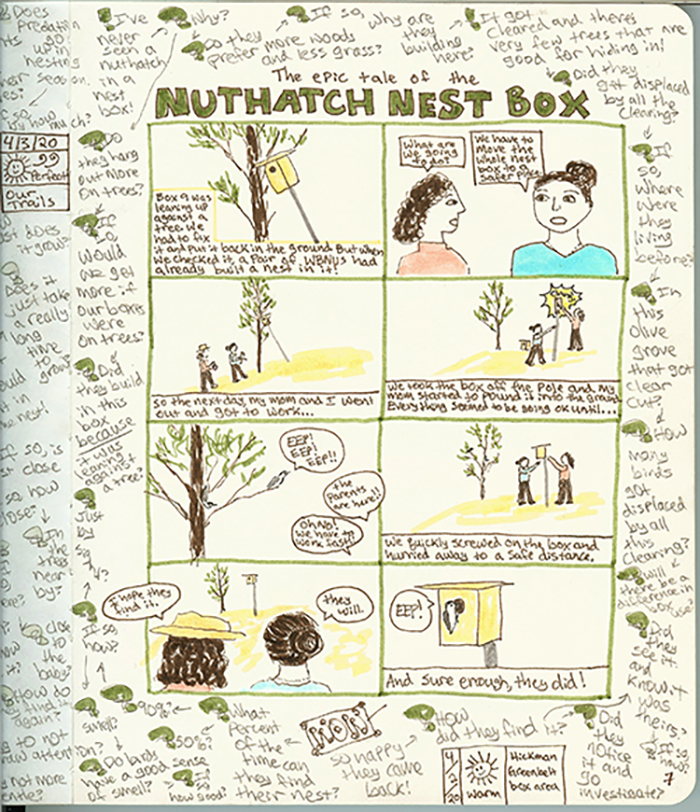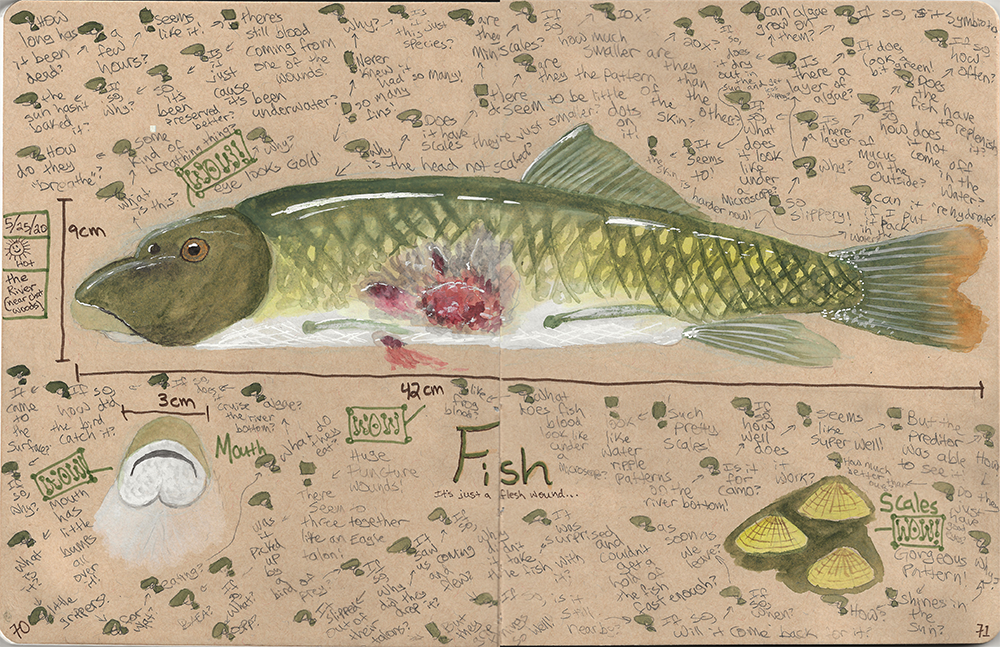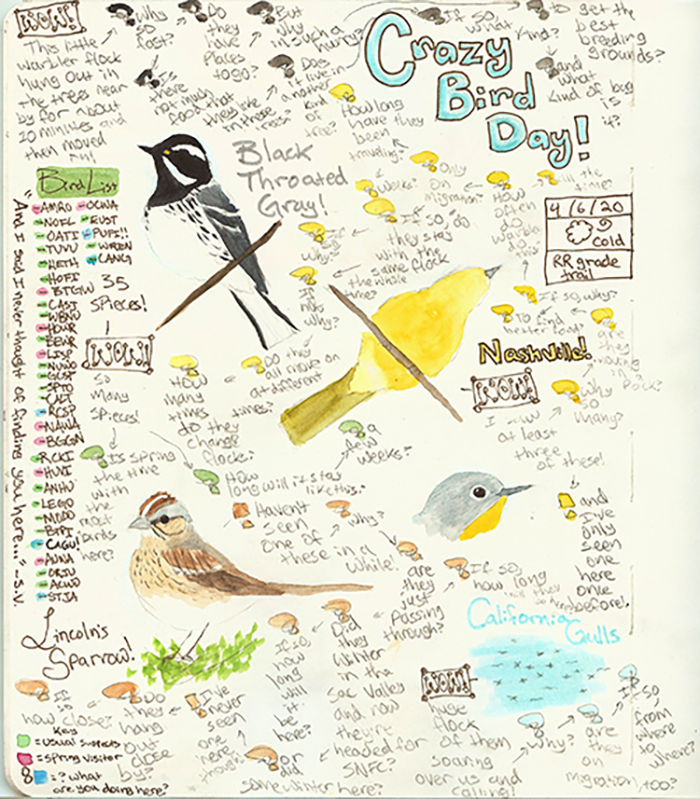My name is Fiona and I am 16 years old. I am not necessarily what you might call your “typical teenager.” I do not watch TV and I rarely use a computer, except under these recent circumstances where I have to use one for school. I just recently got a cell phone, much to my chagrin, and I only use it to text friends concerning homework and such. (Also, since I have had to shelter in place, I have been using it to stay in touch with friends.) Otherwise, I leave my phone at home and do not take it with me anywhere. I have no social media accounts, and don’t want any. Instead of getting lost in the overwhelming world of social media, I prefer to get lost in the overwhelmingly amazing world of nature.
One of my great loves besides nature is art. I have loved drawing ever since I could hold a pencil. I also really love nature, and it has always been a big part of my life. Since I was 3 years old, I have attended Waldorf schools, where art and nature are an integral part of the curriculum. My family is blessed to live in Northern California near a river canyon, with hundreds of miles of open space and wild trails right out our back door. I feel so lucky to be surrounded by nature, and I felt welcomed into it from a very early age.
On the day before I turned 13, I had the good fortune of a chance meeting with artist, naturalist, author, and educator John Muir Laws (aka “Jack”), and that moment completely changed my life. Through Jack, I learned about nature journaling, which is this amazing combination of two things I love that go great together: art and nature. Jack and I became friends and sketching buddies, and we have had lots of fun nature experiences together. I love exploring nature with Jack because he is so joyful about the world and that joy is contagious. He is excited about everything, like a child who is seeing it for the first time and is amazed by it. It is so fun to go out and journal with him.
Now, nearly 4 years and 2000 nature journal pages later, nature journaling is an integral part of my life. Not only has it changed the way I look at nature, it has also changed the way I look at life in general.
Nature journaling helps me connect more deeply with nature. Through the pages of my journal, I can explore and express the wonders and the beauties of nature. It is incredibly important to stay connected to nature because being in nature makes me feel so calm and so happy—I feel so lucky to be alive when I am out in the world, looking at all the intricacies and mysteries that nature has to offer.
Nature is also such an incredible resource—there is so much to wonder about, so much to see, and so much to stand in awe of. There is so much beauty in the world if we stop to look…if we stop and smell the flowers, and draw the flowers while we are at it.
Not only is nature amazing, it is also our life source. All of these phenomena, all of these mysteries make up this beautiful web that is allowing us to live, and understating that is a really key part of being alive on this planet.
Perhaps the biggest lesson nature journaling has taught me is the joy of curiosity. When I am nature journaling, I slow down enough to wonder, to realize all the things I don’t know, and this ignites my curiosity. Research shows that when we are curious, our minds are primed to learn and remember more. I love to ask questions in my journal, and the more detail I see and document, the more questions I have. As David Allen Sibley wrote in his foreword to Jack’s book, The Laws Guide to Drawing Birds: “When I am drawing, I look more closely and ask and answer questions that I would not have considered if I was just watching.”
Questions are intrinsically good in themselves because they pull me into a state of heightened awareness and focus. Research shows that curiosity is one of the precursors of moving into a flow state. (A flow state is what many people call their “happy place,” where you get so engrossed in what you are doing that you lose track of time.) This flow state triggers a mix of potent neurotransmitters in my brain, while at the same time, reducing blood flow to the part of my brain that houses my inner critic, helping to mute it. (Muting the self-critic is especially important to me because my self-critic is a huge negative part of my life.) Curiosity is a dopamine-mediated response, meaning that my brain gets a squirt of dopamine when I get curious, so curiosity literally feels good.
Asking questions is fun, and because I don’t worry about the answers at the moment, it’s very freeing. If I had to answer all the questions I ask in my journal, it would paralyze me. I’m not saying that answers are not important—just that the act of asking questions helps me go deeper into the mystery. I start with basic questions, and then those questions lead to more interesting questions. In fact, the best questions often come after many simple ones. This is what I call question chains—a series of questions, starting with simple ones and getting more complex, each new question building on the last. In fact, often without even being answered, these questions will take me into a thought process and investigation that I would not reach otherwise. If I do decide to go look something up, I don’t just stop when I get the answer to the question, I let it spark another question.
Sadly, it seems that many people in our society are afraid of questions. When we were small children, we asked lots of questions. But at some point, we stopped. In fact, a lot of people, teenagers and adults alike, are afraid to ask questions. Why? Perhaps we don’t want to look stupid, or we don’t want anyone to know that we don’t know all the answers. I have found that building the skill of curiosity in the safety of my own nature journal has given me the opportunity to practice asking lots of questions concerning other topics, and the courage to do it more and more. Getting curious in my nature journal has enabled and empowered me to look beyond my journal and question everything around me.
I think, now, in this moment in our world’s history, asking questions is vital to our survival. If we, as humans, accept and embrace questions, we will be able to see where we are heading as a planet and take steps to change that path. One of the best questions I have ever heard came from a Mary Oliver poem, “The Summer Day”: “Tell me, what is it you plan to do with your one wild and precious life?” I now know my answer: I want to spend my life observing, wondering about, and standing in awe of nature and all it has to offer. But the awe is only the beginning: I want to spend my life taking care of nature and fighting to protect it. In order to do this, I will be carefully observing the natural world, writing and drawing a lot in my journal, and asking lots of questions.
Explore Fiona’s website at www.fionasongbird.com/naturalist.html.









